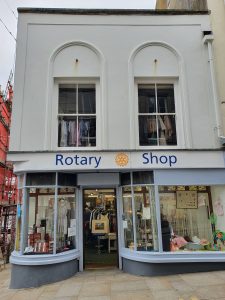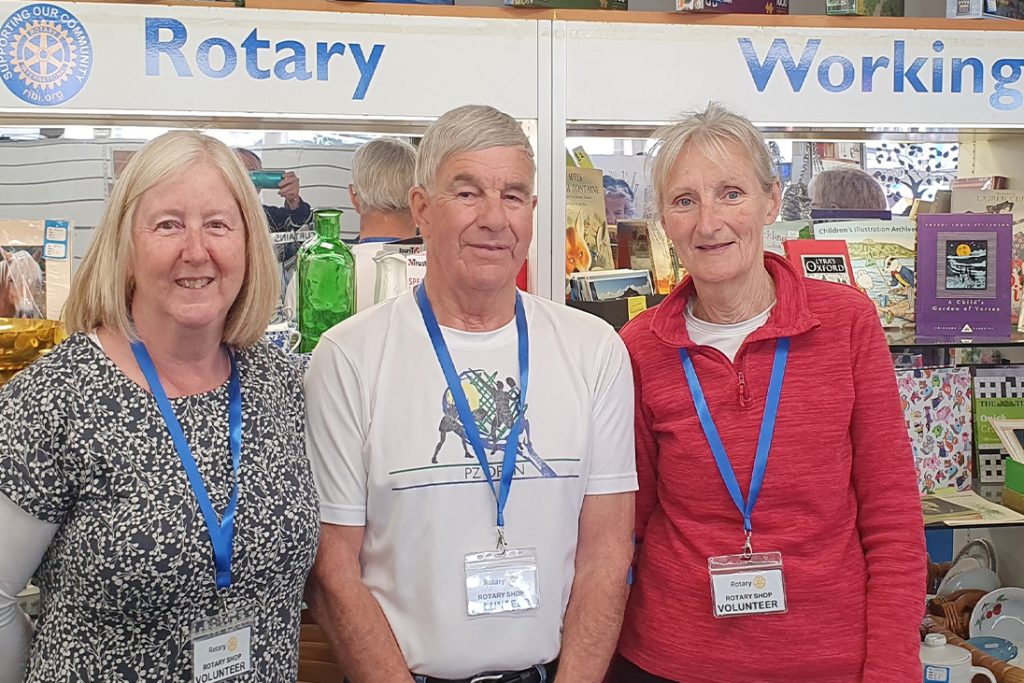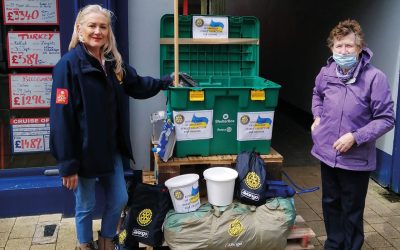Famous for its pirates and picturesque views, the Cornish town of Penzance is also home to both Penzance Rotary and Mounts Bay Rotary.
For the past eight years, the two clubs have joined forces to run a highly successful shop in the centre of Penzance which raises tens of thousands of pounds for good causes in the region.
The idea of a Penzance Rotary Shop was first contemplated by Rotarian Jon Symons in 2013.
Listen to this article
No.1 Market Place, Penzance was home to one of the longest continually trading chemist shops in the country until 2011 when the tenant moved out and locked it up for the final two years of the lease.
The premises have been owned by the Symons family for around 200 years. Jon’s great-great grandfather and great grandfather were each born above the shop in 1825 and 1854, respectively.
It was also the location at which celebrated chemist and inventor of the miner’s safety lamp which carried his name, Humphry Davy, spent time whilst apprenticed to the apothecary John Bingham Borlase in the late 1790s.
From the 1820s, for around one hundred years, the business traded as ‘Symons Chemist’ after which it was rented out and traded as ‘Peasgood Chemist’ for a further 90 years.
No sooner was the property put on the rental market in 2013, for the first time in over two centuries, than POPUP Penzance approached Jon to see if the shop could be put to temporary community use. That started the ball rolling with the idea of establishing a Rotary charity shop.
As the impact of the pandemic hit, Penzance and Mounts Bay Rotary clubs amalgamated their grant-giving efforts to provide financial relief to families in their area hardest hit and experiencing the greatest deprivation.”
Jon, a member of Penzance Rotary, spoke to Rotarians in Launceston at the opposite end of Cornwall who had successfully set up a charity shop. He produced a written proposal and pitched the idea of a charity shop to his club.
“I had noticed there were at least two Rotary charity pop-up shops in existence which were proving successful, albeit they had to move premises from time to time because they only had month-by-month agreements to use their premises,” explained Jon.
“After speaking to Rotarians at Launceston and establishing a few fundamentals about how their venture was working, I pitched the concept to my fellow Rotarians in Penzance early in 2014.
“Penzance Rotary Club had a small and ageing membership, and my club concluded that we were not in a position to take on such a commitment.”
In July 2014, Mounts Bay Rotary had the same idea and agreed to take the premises on a three-month trial basis, with a short-term licence agreement.
The agreement required Mounts Bay Rotary to work together with Penzance Rotary to ensure the best chance of success for the venture.
Any profits were initially shared 75%-25% to reflect that it was Mounts Bay Rotary which had taken on the property, fitted it out and provided the majority of the volunteers.
Jon explained that charity shops qualify for a mandatory 80% business rates relief, with a further 20% relief being at the discretion of the local authority.


The idea of a Penzance Rotary Shop was first contemplated by Rotarian Jon Symons in 2013.
In the case of the Penzance Rotary Shop, rent is paid to the landlord, and in return, the landlord grants a secure short-term lease, pays the building insurance and maintains the exterior.
Initially, the shop traded from Tuesday to Saturday each week with two shifts of volunteers working from 10am to 1pm and 1pm to 4pm.
With two volunteers on duty at all times, this required twenty-four volunteer slots to be filled each week.
In addition, a small team of backroom volunteers put in many hours each week sorting and preparing goods for sale.
Donors are encouraged to complete a Gift Aid Form which enables Rotary to claim back thousands of pounds a year from Her Majesty’s Revenue & Customs.
Special two-part price tags are used to identify which goods were donated by which donors and used to collate end of year declarations for HMRC.
The initial three-month trial proved to be a success and a subsequent six-month licence agreement was agreed.
These initial licence agreements have since been followed by a series of one-year and then two-year leases during the last six years. The share of profits has been gradually altered to reflect the change in the supply of volunteers, now 50:50.
More recently, the Penzance Rotary Shop has been formed into a Charitable Incorporated Organisation (CIO) in its own right and the new CIO was approved by the Charities Commission.
Eight trustees are drawn equally, four from each of the two Rotary clubs. A new five-year lease with built in break options commenced in September last year.


Lynn, Des and Penny – three volunteers at the Penzance Rotary Shop.
Jon said that the profits made by the shop make a real difference in the community. From the outset, the unique selling point of the shop has been that goods donated locally raise money for the benefit of worthwhile local causes.
“A friendly rivalry that had existed between the two Rotary clubs in the past was soon replaced by a deep spirit of cooperation and common purpose,” he explained.
The first year’s surplus was £18,500. Over the first five years a total surplus of £100,000 had been distributed, and the most recent full year’s surplus was £35,000.
“Each of the two clubs have committees to process grant applications and these committees advise their respective clubs on the worthiness of the applications.”
Remarkably, over the last two years during the pandemic, the shop’s income has been higher than ever.
Although there were many months of enforced closure for the shop followed by a further period during which volunteers were unavailable, two notable factors worked in the shop’s favour.
Firstly, the shop received support from Cornwall Council with a £25,000 retail grant. They also benefited from a bequest from a customer who bequeathed the contents of her flat to the shop, worth almost £30,000.
A friendly rivalry that had existed between the two Rotary clubs in the past was soon replaced by a deep spirit of cooperation and common purpose.”
As the impact of the pandemic hit, Penzance and Mounts Bay Rotary clubs amalgamated their grant-giving efforts to provide financial relief to families in their area hardest hit and experiencing the greatest deprivation.
Jon explained: “The south-west contains some of the most economically deprived areas in the country, parts of Penzance and Newlyn being particularly underprivileged.
“In summer 2020, 20 primary schools and three senior schools were asked to identify those families that they believed to be suffering the greatest hardship.
“Many households had lost all income with the sudden cessation of work and then discovered that their employment status meant that they were ineligible for government support in the short term.
“The suggestion to each school was that they provide up to ten households with £50 each to help them through the hardest time whilst they applied for support. The exercise was repeated twice more, the most recent being in the run up to Christmas 2021.”
The Rotary clubs also made donations of more than £6,000 to local food banks and in total, in excess of £40,000 has been distributed in hardship relief alone.
To find out more head over to the Rotary Penzance Shop Facebook page.


























































